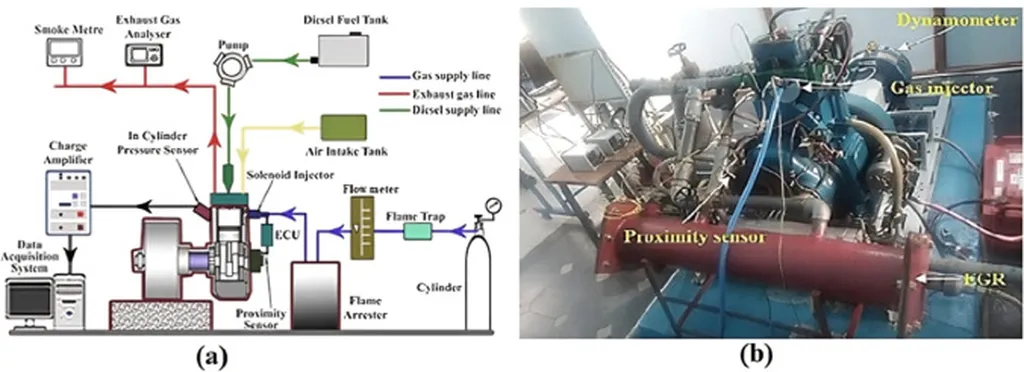In the quest for sustainable and cost-effective alternatives to diesel fuel, researchers have turned their attention to biodiesel derived from non-edible biomass, with a particular focus on Soapnut fruit biodiesel (SFB). However, SFB comes with its own set of challenges, including increased nitrogen oxide (NOx) emissions and reduced engine efficiency. A recent study published in *Results in Engineering* (translated as *Engineering Results*) offers a promising solution: hydrogen fumigation.
Christopher Selvam D., a researcher from the Department of Mechanical Engineering at Saveetha School of Engineering, SIMATS, Saveetha University in Chennai, India, led the investigation into the effects of hydrogen fumigation on the combustion efficiency and emission characteristics of a single-cylinder compression ignition (CI) engine running on SFB. The study found that introducing hydrogen at 10% of the intake air volume significantly improved engine performance and reduced emissions.
The results were striking. Brake thermal efficiency (BTE) increased by 6.0%, and brake-specific fuel consumption (BSFC) decreased by 7.1% when using SFB with hydrogen (SFB + H₂) compared to SFB alone. Emissions of NOx, carbon monoxide (CO), and smoke opacity were reduced by 12.1%, 40.2%, and 30.4%, respectively. Hydrocarbon (HC) emissions also saw a substantial reduction of 33.3%. Additionally, peak in-cylinder pressure increased by 10.3%, and the heat release rate (HRR) improved by 20.0%.
“These enhancements can be attributed to the superior diffusivity, rapid flame propagation, and minimal ignition energy associated with hydrogen, which facilitate a more thorough combustion process,” explained Selvam.
The study’s findings suggest that hydrogen-enhanced SFB could be a viable dual-fuel strategy for achieving cleaner and more efficient engine performance in various sectors, including agriculture and transportation. This research could have significant implications for the energy sector, particularly in the development of cleaner and more efficient combustion engines.
As the world continues to seek sustainable energy solutions, the integration of hydrogen with biodiesel like SFB presents a promising avenue for reducing emissions and improving engine performance. The study’s results not only highlight the potential of hydrogen fumigation but also pave the way for further research and development in this field.
“The findings substantiate the viability of hydrogen-enhanced SFB as a promising dual-fuel strategy for achieving cleaner and more efficient engine performance in various domains, including agriculture and transportation,” Selvam added.
This research could shape future developments in the field by encouraging further exploration of hydrogen-enhanced biodiesel blends and their applications in different engine types. As the energy sector continues to evolve, the integration of renewable energy sources and advanced technologies will be crucial in meeting global sustainability goals. The study published in *Results in Engineering* offers a glimpse into the potential of hydrogen-enhanced biodiesel and its role in creating a more sustainable energy future.

